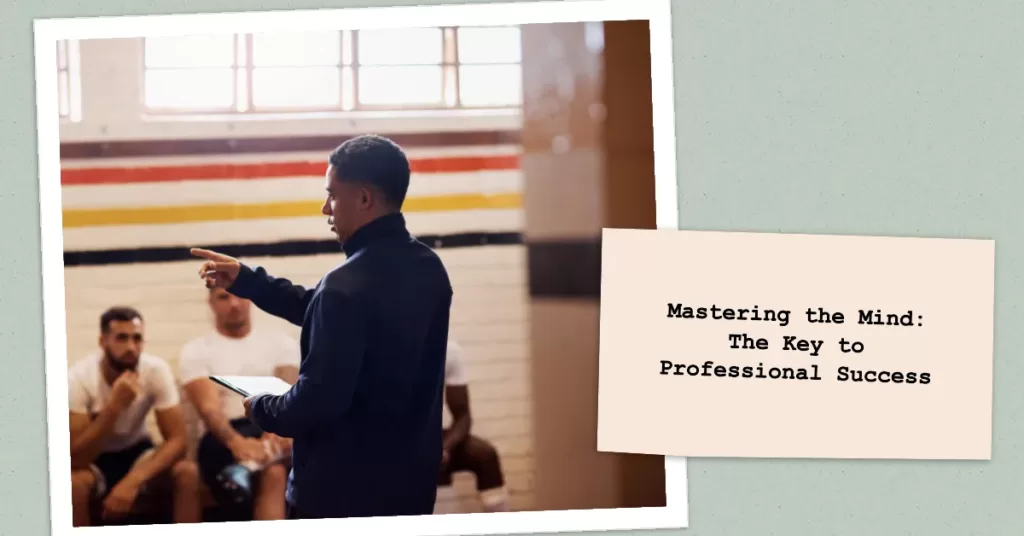Are you an athlete looking to improve your performance on the field or court? Have you ever considered the impact that your mindset has on your athletic abilities? Mindset coaching in sports is a growing field that can help athletes of all levels achieve their goals and reach their full potential.
Mindset coaching focuses on developing a positive and growth-oriented mindset, which can lead to increased confidence, motivation, and resilience. By working with a mindset coach, you can learn techniques for overcoming self-doubt, managing stress and anxiety, and staying focused during competition. With the right mindset, you can approach challenges as opportunities for growth rather than obstacles to overcome. In this article, we will explore the basics of mindset coaching in sports, including its benefits, techniques, and how it can be applied across different sports. Whether you are a beginner or a seasoned athlete looking to take your game to the next level, mindset coaching could be just what you need to unlock your full potential.
Table of Contents
Key Takeaways
- Mindset coaching helps athletes achieve their goals and reach their full potential by developing a positive and growth-oriented mindset.
- The use of visualization, affirmations, self-talk, goal-setting, and action planning are some of the techniques used in mindset coaching.
- Coaches play an important role in helping athletes develop the right mindset, especially youth athletes who greatly benefit from receiving guidance and support in cultivating a growth mindset.
- Adopting a growth mindset helps athletes succeed not just in sports but also in life by improving mental toughness and resilience, embracing failure, setting realistic goals, and focusing on the process.
Understanding the Basics of Mindset Coaching in Sports
You might be wondering what exactly mindset coaching in sports entails, but don’t worry, it’s simply a matter of understanding the foundational principles and techniques that can help you improve your mental game on the field or court. Essentially, mindset coaching is about developing a positive, growth-oriented attitude toward your performance. This means focusing on the process of improvement rather than just the end result.
One key aspect of mindset coaching is learning to manage negative self-talk and doubt. Many athletes struggle with self-doubt and criticism, which can become a major obstacle to achieving their goals. Mindset coaches work with athletes to identify these negative patterns and replace them with more positive, supportive thoughts. By doing so, athletes are able to build greater confidence in their abilities and approach challenges with a more optimistic outlook.
Another important principle of mindset coaching is learning how to stay focused on the present moment. Oftentimes, athletes get caught up in worrying about past mistakes or future outcomes instead of staying fully engaged in the present task at hand. Mindset coaches teach strategies such as mindfulness meditation and visualization exercises to help athletes stay grounded in the moment and perform at their best.
Overall, mindset coaching is all about cultivating a growth-oriented attitude toward performance that focuses on continuous improvement rather than just winning or losing. With the right tools and support from a skilled coach, you can learn how to overcome obstacles like self-doubt and distraction so that you can achieve your full potential as an athlete.
Benefits of Mindset Coaching
Improving your mental game with mindset coaching has many benefits when it comes to sports. One of the most noticeable is an increase in performance on the field or court. When you learn how to control your thoughts and emotions, you can better handle pressure situations and stay focused during games. This leads to more consistent and successful performances.
Another benefit of mindset coaching is a boost in confidence. By learning how to think positively and visualize success, you can build a stronger belief in yourself and your abilities as an athlete. This confidence can then translate into improved performance, as you feel more comfortable taking risks and pushing yourself outside of your comfort zone.
Mindset coaching also helps athletes develop better coping skills for dealing with setbacks and failures. Rather than dwelling on mistakes or letting them impact future performances, athletes who have undergone mindset coaching are better equipped to bounce back quickly from disappointments. They understand that failure is a natural part of the learning process and use their mental tools to move forward from these experiences.
Mindset coaching can lead to increased enjoyment of sports by helping athletes develop a healthier relationship with competition. By focusing on personal growth rather than external validation or winning at all costs, athletes can find greater meaning in their sport and enjoy the journey toward improvement without becoming overly fixated on outcomes beyond their control.
Overall, investing in mindset coaching can be highly beneficial for any athlete looking to improve their performance, confidence, resilience, and overall enjoyment of sports.
Mindset Coaching Techniques

As a mindset coaching client, you’ll benefit from learning different techniques to help you develop a stronger mental game. Three important techniques include visualization and imagery, affirmations and self-talk, and goal-setting and action planning. By practicing these techniques regularly, you can improve your focus, boost your confidence, and increase your chances of success both on and off the field. Let’s explore each technique further so you can start incorporating them into your mindset training today.
Visualization and Imagery
Using vivid imagery and detailed visualization techniques, you can mentally prepare yourself for competition by envisioning successful performances.
Here are four steps to help you visualize your way to success:
- Close your eyes and focus on your breathing. Take deep breaths in through your nose and out through your mouth.
- Imagine yourself in a competitive environment, whether it’s a stadium or a gymnasium. Visualize every detail: the smells, sounds, and sights around you.
- Picture yourself performing with confidence and skill. See yourself executing each move flawlessly and without hesitation.
- Finally, imagine achieving your goal – whether that’s winning a match or setting a personal record. See yourself celebrating with joy and pride.
Visualization can be an incredibly powerful tool for athletes looking to improve their mindset and performance. By regularly practicing these techniques, you can train your brain to feel more confident, focused, and motivated when it comes time to compete – ultimately leading to better results on the field or court.
Affirmations and Self-Talk
With positive affirmations and self-talk, you have the power to transform your mindset and reach new heights in sports. By speaking kindly to yourself and focusing on your strengths, you can boost your confidence and motivation, paving the way for success on the field or court.
One powerful technique is to create a table with two columns: one for negative self-talk, and another for positive affirmations. In the negative column, write down any self-critical thoughts that come to mind during practice or competition. Then, in the positive column, replace each negative thought with a supportive affirmation. For example, if you catch yourself thinking “I always mess up under pressure,”replace it with “I am capable of handling pressure situations with ease.”By consistently practicing these positive affirmations and replacing negative self-talk with them, you can train your brain to think more positively and build a stronger mental game. Remember: what you tell yourself matters!
By incorporating affirmations and positive self-talk into your training regimen, you can unlock the full potential of your mind-body connection and achieve greater success in sports. Don’t let limiting beliefs hold you back – instead, empower yourself by speaking words of encouragement to yourself every day. With dedication and practice, this simple yet powerful tool can help take your athletic performance to the next level!
Goal-Setting and Action Planning
Now that you understand the power of affirmations and self-talk in sports, it’s time to take your mindset coaching to the next level. Goal-setting and action planning are essential components of achieving success in any sport or activity. By setting clear goals and creating a plan of action, you can stay focused, motivated, and dedicated to reaching your full potential.
Setting goals involves identifying what you want to achieve both short-term and long-term. It’s important to make these goals specific, measurable, achievable, relevant, and time-bound (SMART). Once you have set your goals, it’s crucial to create an action plan that outlines the steps you need to take to reach them. This may involve breaking down larger goals into smaller ones or identifying obstacles that need to be overcome. With a clear plan in place, you’ll be able to track your progress more effectively and adjust as needed along the way. So start setting those SMART goals today!
Applying Mindset Coaching in Different Sports
You can easily apply mindset coaching in different sports to help you visualize your success and achieve your goals. This approach is not limited to any particular sport, as it can be used across various disciplines.
Here are three ways that mindset coaching can be applied to different sports:
- In team sports such as basketball or football, a coach can use mindset coaching to foster a sense of teamwork and unity among players. By emphasizing the importance of individual roles within the team, players will feel valued and motivated to perform their best.
- In solo sports such as tennis or golf, coaches can use mindset coaching to help athletes manage their emotions during competition. By teaching them how to stay focused and calm under pressure, athletes will be more likely to succeed in high-pressure situations.
- In endurance sports like running or cycling, coaches can use mindset coaching to help athletes push through physical barriers by building mental resilience. By developing strategies for dealing with pain and fatigue during long races, athletes will be better equipped mentally to handle the challenges they face.
Overall, applying mindset coaching in different sports is an effective way for athletes at all levels of experience and expertise to achieve their goals and maximize their potential. Whether you’re part of a team or competing solo, learning how to harness the power of your mind is a crucial component of success in any sport. With the right guidance from a qualified coach, you too can unlock your full potential and reach new heights in your athletic pursuits!
Mindset Coaching for Athletes of All Levels
Coaches play an important role in helping athletes of all levels develop the right mindset. For youth athletes, it’s about instilling confidence and teaching them to enjoy the process of learning and growing. For amateur athletes, it’s about balancing their passion for the sport with other aspects of their life, such as work or school. And for professional athletes, it’s about helping them stay focused on their goals while navigating the pressures and expectations that come with competing at the highest level. By tailoring the coaching approach to each athlete’s unique needs and goals, coaches can help them unlock their full potential and achieve success both on and off the field.
Youth Athletes
During the early stages of their athletic development, young athletes can greatly benefit from receiving guidance and support in cultivating a growth mindset. As a youth athlete, you are most likely still figuring out your abilities and what you would like to achieve as an athlete. In this phase of your journey, it is crucial to have a positive outlook toward challenges and mistakes as they provide opportunities for learning and growth.
To help you develop a growth mindset, coaches often use different techniques such as goal-setting, visualization, and self-reflection. These techniques not only help in developing mental toughness but also aid in building resilience – the ability to bounce back from setbacks. Below is a table that outlines some of the benefits of adopting a growth mindset versus a fixed mindset:
| Growth Mindset | Fixed Mindset |
|---|---|
| Embraces challenges | Avoids challenges |
| Learns from criticism | Ignores criticism |
| Views failure as an opportunity for growth | Views failure as evidence of lack of ability |
| Puts in the effort to improve skills | Believes abilities cannot be improved |
| Is inspired by others’ success | Feels threatened by others’ success |
As you can see from the table above, adopting a growth mindset has many benefits that will help you succeed not just in sports but also in life. By focusing on continuous improvement rather than just results, you will be able to overcome obstacles with ease and reach your full potential as an athlete.
Amateur Athletes
Amateur athletes who strive for excellence and dedicate themselves to consistent practice are more likely to achieve their goals. As a mindset coach, it is important for me to remind you that success in sports does not come overnight. It takes time, effort, and patience to reach your desired level of performance. However, by adopting the right mindset and following these three key principles, you can improve your athletic abilities and ultimately achieve success:
- Embrace failure: Failure is inevitable in sports, but it is also an opportunity to learn from mistakes and grow as an athlete. Instead of being discouraged by setbacks, use them as motivation to work harder and improve.
- Set realistic goals: While it’s important to have big dreams and aspirations, setting achievable short-term goals can help you stay focused on your progress and build confidence along the way.
- Focus on the process: Rather than obsessing over outcomes or results, focus on the daily habits that will lead you toward success. Celebrate small victories along the way and trust in the process of consistent hard work.
Remember that achieving greatness in sports requires both physical ability and mental strength. By cultivating a growth mindset and utilizing these principles in your training, you can take control of your athletic journey and reach new heights of success.
Professional Athletes
Professional athletes often face immense pressure to perform at the highest level, both from themselves and their fans. This pressure can be overwhelming and lead to a negative mindset that affects performance. That is where mindset coaching comes in. By working with a coach, professional athletes can learn how to manage their thoughts and emotions, develop a positive attitude toward challenges, and stay focused on their goals.
Mindset coaching helps professional athletes overcome mental barriers that may be holding them back from achieving success. It teaches them how to develop resilience, perseverance, and confidence in themselves and their abilities. With the right mindset, professional athletes can perform at peak levels consistently, even under pressure. A good mindset coach will work closely with an athlete to understand their unique challenges and create personalized strategies for overcoming them. Whether it’s dealing with injuries or managing stress before big games, mindset coaching can help professional athletes achieve their full potential.
Finding the Right Mindset Coach
You’ll easily discover the perfect mindset coach to fit your needs by taking the time to research and interview potential candidates. It’s important to find someone who has experience working with athletes in your particular sport, as well as someone who you feel comfortable communicating with. Don’t be afraid to ask for references or testimonials from past clients.
To ensure you find the right mindset coach, consider these four factors:
- Compatibility: You want the coach who understands your personality and can work with you in a way that is effective and enjoyable. Look for someone who is approachable, empathetic, and able to communicate clearly.
- Qualifications: While anyone can claim to be a mindset coach, you want someone who has actual experience working with athletes at your level of competition. Check their credentials and see if they have any certifications or relevant training.
- Coaching style: There are many different approaches to mindset coaching, so it’s important to find one that resonates with you. Some coaches may focus on visualization techniques while others may use more analytical methods. Choose a coach whose style aligns with your personal preferences.
- Availability: Finally, make sure the coach has enough time available for your needs. If they are too busy or unable to commit enough time to helping you reach your goals, then it might not be worth investing in their services.
By considering these four factors when searching for a mindset coach, you’ll be able to find someone who can help take your game to the next level. Remember that finding the right coach is just as important as putting in hard work on the field or court – investing in yourself mentally can often lead to greater success overall!





